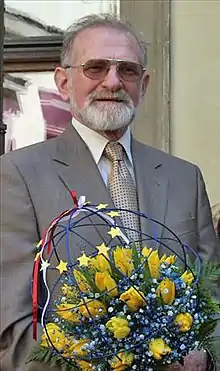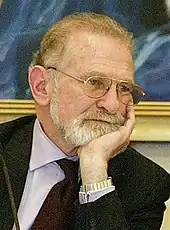Bronisław Geremek
Bronisław Geremek (Polish pronunciation: [brɔˈɲiswav ɡɛˈrɛmɛk] (![]() listen); born Benjamin Lewertow;[1] 6 March 1932 – 13 July 2008) was a Polish social historian and politician. He served as Member of Parliament (1991–2001), Minister of Foreign Affairs (1997–2000), leader of the Freedom Union (2000–2001) as well as Member of the European Parliament (2004–2008).
listen); born Benjamin Lewertow;[1] 6 March 1932 – 13 July 2008) was a Polish social historian and politician. He served as Member of Parliament (1991–2001), Minister of Foreign Affairs (1997–2000), leader of the Freedom Union (2000–2001) as well as Member of the European Parliament (2004–2008).
Bronisław Geremek | |
|---|---|
 Bronisław Geremek in May 2004. | |
| Minister of Foreign Affairs of Poland 5th Minister of Foreign Affairs of the Third Republic of Poland | |
| In office 31 October 1997 – 30 June 2000 | |
| President | Aleksander Kwaśniewski |
| Prime Minister | Jerzy Buzek |
| Preceded by | Dariusz Rosati |
| Succeeded by | Władysław Bartoszewski |
| Chairman of the Freedom Union | |
| In office 18 December 2000 – 14 October 2001 | |
| Preceded by | Leszek Balcerowicz |
| Succeeded by | Władysław Frasyniuk |
| Personal details | |
| Born | Benjamin Lewertow 6 March 1932 Warsaw, Poland |
| Died | 13 July 2008 (aged 76) Lubień, Poland |
| Political party | Freedom Union, Partia Demokratyczna – demokraci.pl. (Democratic Party) |
| Spouse(s) | Hanna Geremek |
| Profession | Historian |
Early life and education
Bronisław Geremek was born as Benjamin Lewertow in Warsaw on 6 March 1932. His father Boruch Lewertow, a fur merchant,[1] was murdered in Auschwitz.[2] His mother, Sharca, and he were smuggled out of the Warsaw Ghetto in 1943 and were sheltered by Stefan Geremek. Geremek later married Bronisław's mother and Bronisław was further raised in a Roman Catholic tradition.[1] In his adult life he considered himself neither a Jew nor a Catholic. His grandfather was a maggid, his brother Jerry, lived in New York as a Jew, and his sons living in Poland are Roman Catholics.[1]
In 1954 Bronisław Geremek graduated from the Faculty of History at the Warsaw University, and in 1956–1958 he completed postgraduate studies at the École pratique des hautes études in Paris. He completed his PhD in 1960 and in 1972 he was granted a postdoctoral degree at the Polish Academy of Sciences (PAN). In 1989 he was appointed associate professor.
The chief domain of Geremek's scholarly work was research on the history of culture and medieval society. His scholarly achievements included numerous articles and lectures, as well as ten books, which have been translated into ten languages. His doctoral thesis (1960) concerned the labour market in medieval Paris, including prostitution. His postdoctoral thesis (1972) concerned underworld groups in medieval Paris.
Almost the whole of Geremek's scholarly career was connected with the Institute of History of the Polish Academy of Sciences, where he worked from 1955 to 1985. However, from 1960 to 1965 he was a lecturer at the Sorbonne in Paris and the manager of the Polish Culture Centre of that university. Geremek was given honorary degrees by the University of Bologna, Utrecht University, the Sorbonne, Columbia University, Waseda University, and Jagiellonian University in Kraków. In 1992 he was designated visiting professor at the Collège de France. He was a member of Academia Europea, the PEN Club, the Société Européenne de Culture, fellow of Collegium Invisibile[3] and numerous other societies and associations.
He was a longtime professor and Chairholder of the Chair of European Civilisation at the College of Europe until his death.[4]
Political activity
History of Poland (1945–1989)
In 1950 Geremek joined the Polish United Workers' Party (PZPR). He was the second secretary of the Basic Party Organisation (POP) of the PZPR at Warsaw University. In 1968, however, he withdrew from the party in protest against the Warsaw Pact's invasion of Czechoslovakia.
In the 1970s Geremek was considered one of the leading figures in the Polish democratic opposition. In 1978 he co-founded the Society for Educational Courses, for which he gave lectures. While on a Fellowship at the Wilson Center in Washington DC, he met General Edward Rowny who introduced him to Lane Kirkland and Ronald Reagan.[5] In August 1980 he joined the Gdańsk workers' protest movement and became one of the advisers of the Independent Self-Governing Trade Union Solidarność (Polish for "Solidarity") – NSZZ. In 1981 he chaired the Program Commission of the First National Convention of Solidarity. After martial law was declared in December 1981 he was interned until December 1982, when he once again became an adviser to the then-illegal Solidarity, working closely with Lech Wałęsa. In 1983 he was arrested by the Polish authorities.
Polish Round Table Agreement
Between 1987 and 1989 Geremek was the leader of the Commission for Political Reforms of the Civic Committee, which prepared proposals for peaceful democratic transformation in Poland. In 1989 he played a crucial role during the debates between Solidarity and the authorities that led to free parliamentary elections and the establishment of the ‘Contract Sejm’.
Third Polish Republic
Geremek then became one of the founders of The Democratic Union (later merged into The Freedom Union) and was the leader of the Democratic Union's parliamentary group from 1990 to 1997. After the elections in 1991 President Lech Wałęsa asked him to form a new government, but Geremek failed to do so and Jan Olszewski was appointed Prime Minister instead.
From 1989 to 2001 Geremek was a member of the lower house of the Polish parliament, the Sejm, and chairman of the Political Council of the Freedom Union. He chaired the Sejm's Committee on Foreign Affairs from 1989 to 1997, its Constitutional Committee from 1989 to 1991 and its European Law Committee from 2000 to 2001.
After a coalition government was formed in October 1997 by the Solidarity Electoral Action (AWS) and the Freedom Union Geremek served as Minister of Foreign Affairs under Prime Minister Jerzy Buzek until 2000. In 1998 Poland chaired OSCE, and Bronisław Geremek served as Chairperson-in-Office.[6] In March 1999 he signed the treaty under which Poland joined NATO.
European Parliament Deputy

In the election to the European Parliament in June 2004 Geremek was elected as a candidate of the Freedom Union, winning the largest number of votes in Warsaw. In the European Parliament he was a member of the Alliance of Liberals and Democrats for Europe.
Prof Geremek was a great believer in the idea of Europe, though he felt that there is a need to create a clear European identity and the need for people to believe in the benefits that Europe can bring to them- not just as nations, but also as individuals.[7]
In April 2007 Geremek refused to declare that he had never collaborated with the Communist secret service, which he was being asked to do under a new vetting law. In May 2007 the Constitutional Tribunal of the Republic of Poland rejected most of the new vetting law, including the clause that would have made it mandatory for nearly 700,000 Poles to sign declarations certifying that they had never collaborated with the secret services under the old regime.
From 2006 to 2008, he was president of the Jean Monnet Foundation for Europe.
Geremek was a supporter of the Campaign for the Establishment of a United Nations Parliamentary Assembly.[8]
Honours
- 2004: Order of the Three Stars
- 2002: Order of the White Eagle
- Knight Grand Cross in the Order of Leopold II[9]
- 2002: Knight Grand Cross of Order of the Cross of Terra Mariana[10]
- 2000: Order of Merit of the Italian Republic[11]
- Großes Verdienstkreuz mit Stern
- Grand Cross in the Order of Merit of the Federal Republic of Germany
- 2002: Pour le Mérite
- Officer in the Legion of Honour
- 1998: Karlspreis (Charlemagne Award) of the city of Aachen
- 1997: Commander's Cross of the Order of the Lithuanian Grand Duke Gediminas[12]
- Grand prix de la francophonie of the Académie française
Death
Geremek died on 13 July 2008, in a car accident on National Road no. 2 at Lubień near Nowy Tomyśl[13] when the car he was driving hit an oncoming van on the opposite lane, probably due to Geremek falling asleep behind the wheel. He was granted a state funeral, held in Warsaw in the Cathedral of St John. His funeral was attended, among others, by president Lech Kaczyński, prime minister Donald Tusk, and three former presidents Ryszard Kaczorowski, Lech Wałęsa and Aleksander Kwaśniewski.
Posthumous honours
In January 2009, the European Parliament named the main courtyard of the "Louise Weiss", its principal building, after Bronisław Geremek.
Publications
- Litość i szubienica: dzieje nędzy i miłosierdzia (Czytelnik 1989, ISBN 83-07-01490-5)
- Świat "opery żebraczej": obraz włóczęgów i nędzarzy w literaturach europejskich XV-XVII wieku (Państwowy Instytut Wydawniczy 1989, ISBN 83-06-00428-0)
- Rok 1989 – Bronisław Geremek opowiada, Jacek Żakowski pyta (red.: Maria Braunstein; Plejada, Dom Słowa Polskiego 1990)
- The Margins of Society in Late Medieval Paris (Past and Present Publications) by Jean-Claude Schmitt, Bronislaw Geremek, Lyndal Roper, Jean Birrell
- Wspólne pasje (wespół z Georgesem Duby; rozmowę przeprowadził Philippe Sainteny ; przeł. Elżbieta Teresa Sadowska; PWN 1995, ISBN 83-01-11855-5)
- Szansa i zagrożenie. Polityka i dyplomacja w rodzinnej Europie (Studio EMKA 2004, ISBN 83-88607-38-3)
Translations
- Fernand Braudel, Historia i trwanie (seria: "Nowy Sympozjon"; przedmową opatrzyli Bronisław Geremek i Witold Kula; Czytelnik 1971, 1999, ISBN 83-07-02712-8)
References
- "Mój polski brat (My Polish Brother)", interview with Jerry Lewart, by Waldemar Piasecki,
- Bronisław Geremek : Wystąpienia Archived 3 August 2008 at the Wayback Machine
- "List of Fellows". ci.edu.pl. Retrieved 25 April 2011.
- Chair of European Civilisation at College of Europe
- Michael, Szporer (2012). Solidarity; The Great Workers Strike. Lexington Books. pp. 250–251. ISBN 9780739174876.
- "Former OSCE Chairpersons-in-Office | OSCE". www.osce.org. Retrieved 15 May 2018.
- Conversation with Prof Geremek with Ilmas Futehally of Strategic Foresight Group "Archived copy". Archived from the original on 10 October 2009. Retrieved 26 January 2010.CS1 maint: archived copy as title (link)
- "Supporters". Campaign for a UN Parliamentary Assembly. Retrieved 26 September 2017.
- The Marshall Plan Lessons Learned for the 21st Century: Lessons Learned for ...p 124
- "Teenetemärkide kavalerid". Retrieved 12 January 2021.
- "Cavaliere di Gran Croce Ordine al Merito della Repubblica Italiana". Retrieved 12 January 2021.
- "Apdovanotų asmenų duomenų bazė". Retrieved 12 January 2021.
- Polish ex-minister Geremek dies
External links
| Wikimedia Commons has media related to Bronisław Geremek. |
- On the Side of Geremek Adam Michnik eulogizes Geremek in The New York Review of Books
- Bronislaw Geremek's opinion editorial commentaries for Project Syndicate